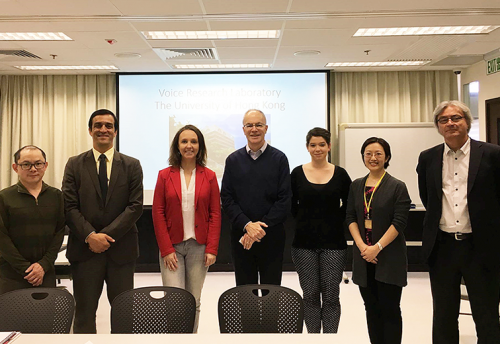
- 11 4 月, 2007
- 700 Views
- Media, Press Release
Study Reveals that Patients with Voice Problems have Lower Quality of Life
A recent study conducted by The Department of Surgery, Li Ka Shing Faculty of Medicine and the Voice Research Laboratory, Division of Speech & Hearing Sciences of The University of Hong Kong reveals that patients suffering from voice problems have a significantly lower quality of life compared with normal people. Most significantly, it was found that patients feel that they are being troubled by their voice problems, and their emotions are being affected. The study, entitled “Cross-cultural Adaptation and Validation of the Chinese Voice Handicap Index-10”, has been published in the international medical journal The Laryngoscope.
Study to Investigate the Quality of Life for Voice Patients
According to overseas studies, voice problems affect about 6% of the general population, and can significantly affect a person’s emotion, social life, work performance and inter-personal relationships. Common voice problems include changes in voice quality, e.g. hoarse, or breathy voice, inability to control the pitch and loudness of the voice, and in the worst case, loss of voice. The change in voice quality may be a result of pathological changes in the vocal folds, such as vocal nodules, polyps, laryngitis, vocal cord palsy or laryngeal cancer.
To get a more comprehensive understanding on the effect of voice problem on daily life, the Divisions of Otorhinolaryngology and Head & Neck Surgery of the Department of Surgery, Li Ka Shing Faculty of Medicine and the Voice Research Laboratory, Division of Speech & Hearing Sciences of The University of Hong Kong has recently completed a research that investigates the quality of life of Hong Kong’s voice patients.
Research Method
The research team recruited 131 Chinese patients, from the age of 18 to 86, with voice problems at the Voice Clinic at the Queen Mary Hospital. The patients were divided into 3 groups according to the vocal pathologies, including: (1) neurogenic (e.g. vocal cord palsy and spasmodic dysphonia), (2) structural (e.g. polyps, nodules, cysts) and (3) inflammatory (e.g. laryngitis). There are respectively 44, 34 and 53 patients in the 3 groups.
The participants were asked to fill in a questionnaire, namely the Chinese Voice Handicap Index (VHI) (please refer to the Appendix for a simplified version called VHI-10). Three domains are assessed in VHI, including the physical domain (e.g. “My voice fluctuates during the day”), the functional domain (e.g. “Others ask me to repeat what I have said when talking face to face”) and the emotional domain (e.g. “My voice makes me nervous when talking to others”). Higher the VHI score, poorer is the quality of life for a voice problem patient. They were then diagnosed by a laryngologist and a speech therapist. A control group that included 54 healthy individuals, aged from 22 to 64, was also invited to fill in the same questionnaire.
Research Results
The research team found that the patient groups had significantly higher scores in the Chinese VHI than the control group, meaning that they have a lower quality of life:
| Disease Groups | Mean Chinese VHI-30 score (Maximum score: 120) |
| Neurogenic | 76.7 |
| Structural | 51.7 |
| Inflammatory | 33.5 |
| Control | 8.4 |
In addition, the group with neurogenic voice disorders was the most affected group, followed by the structural group and the inflammatory group.
Most significantly was that the patients felt that the voice problems troubled them, affecting their emotions. The average scores of the patient groups for the question “My voice problem upsets me” were 2.1 higher than those for the control group (maximum score was 4). This was the largest item score difference between the patient groups and the control group.
Conclusions
The research findings suggest that voice problems not only affect one’s ability to communicate but can also negatively affect one’s emotions and social interactions. It is recommended that anyone who has a change in voice quality consistently for 2 weeks should seek medical advice.


